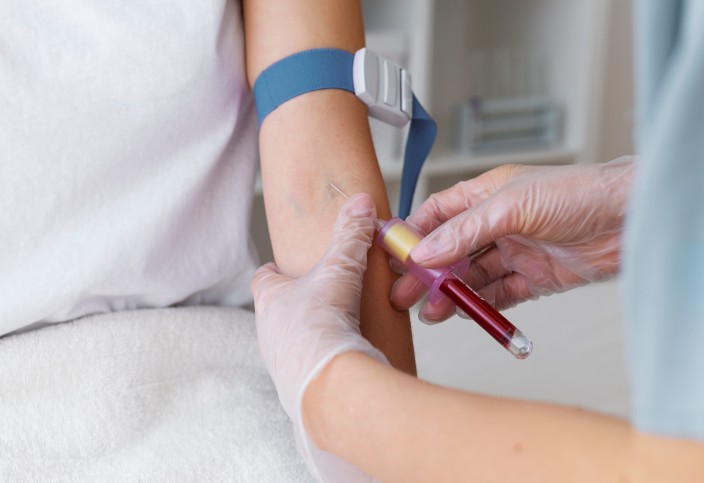Routine Blood Tests: Essential Screenings for Early Detection and Health Monitoring

You walk into a diagnostic lab with a prescription in hand. There is a sense of routine about it. Yet, what is termed a routine blood test carries layers of clinical insight. It is one of medicine’s fundamental tools. A routine blood test does not merely exist to confirm a disease, but it functions as an early indicator of the same.
There are panels ordered for general health checkups, for specific symptom evaluations, or to guide further diagnostic decisions. Let’s understand in detail about routine blood tests in this article.
Types of Blood Tests
There is no singular blood test labelled ‘routine’ in laboratories. The term usually implies a group of specific tests that screen and monitor different aspects of health:
Complete Blood Count (CBC)
Measures red blood cells, white blood cells, hemoglobin, hematocrit, and platelets. It assesses anaemia, infections, or blood disorders. A drop in hemoglobin could hint at iron deficiency, while elevated white cells suggest infection.
Basic Metabolic Panel (BMP)
Measures glucose, calcium, electrolytes like sodium and potassium, kidney function indicators such as blood urea nitrogen (BUN) and creatinine. It builds a quick profile of metabolic and renal health.
Comprehensive Metabolic Panel (CMP)
Extends BMP to include liver function tests. Bilirubin, albumin, and liver enzymes, each number signals the liver’s status in silent efficiency.
Lipid Profile
Checks cholesterol levels like total cholesterol, LDL, HDL, and triglycerides. It is often used to evaluate cardiovascular disease risk.
Thyroid Function Tests.
Includes TSH, T3, and T4 tests. It detects hypothyroidism or hyperthyroidism, conditions influencing metabolism and energy regulation.
Hemoglobin A1c (Glycated Hemoglobin).
Indicates average blood glucose levels over three months. A test that assists in diagnosing diabetes and assessing control in known diabetics.
Coagulation Panel.
Prothrombin time (PT) and activated partial thromboplastin time (APTT). It evaluates blood clotting ability, which is crucial before surgeries.
What Blood Tests Can Detect?
Blood tests do not provide sweeping declarations of health in isolation. Their purpose lies in detecting markers of disease, risk factors, or dysfunctions in physiological processes. A routine blood test can detect:
- Anaemia and blood disorders - Low hemoglobin, abnormal cell counts, or platelet irregularities.
- Diabetes and prediabetes - High fasting glucose or HbA1c levels.
- Kidney function impairment - High creatinine or blood urea nitrogen levels.
- Liver disease indicators - Abnormal liver enzymes or bilirubin.
- Thyroid abnormalities - TSH, T3, T4 deviations signifying hypo or hyperthyroidism.
- Infection or inflammation - High white blood cell counts, CRP in extended panels.
- Cholesterol abnormalities - High LDL or triglycerides increase cardiac risk.
Blood tests guide doctors in correlating symptoms, deciding treatment adjustments, or investigating further with imaging and specialised tests.
How much blood is taken in a test?
People often wonder about the volume of blood drawn during these tests. The vials lined up by nurses may appear excessive, but each tube collects only a small quantity, usually 2 to 10 milliliters, depending on the test.
For a routine panel involving CBC, metabolic panel, and thyroid profile, the total blood drawn is within 20 to 30 milliliters. This limit is well within what the human body regenerates efficiently. Modern vacutainer systems are designed to collect just what is necessary, avoiding wastage and minimising discomfort.
How often should you do a blood test?
The frequency of routine blood tests does not have a universal template. It depends on age, health status, family history, and existing conditions:
- For healthy adults, an annual checkup with routine panels is good to monitor silent changes before symptoms arise.
- For individuals with chronic conditions like diabetes, thyroid disorders, or hypertension need more frequent testing is needed to guide therapy, sometimes every 3 to 6 months.
- If you are on medications affecting liver or kidney functions, periodic blood tests are integral to safe long-term therapy.
Doctors decide the interval. There is no virtue in under-testing or over-testing.
Conclusion
A routine blood test is important, but everyone ignores it. It unravels what symptoms conceal or what future risks attempt to build unnoticed. Each parameter measured feeds into a wider narrative of your health's status, its silent shifts, and its needs for intervention or reassurance.
If you intend to initiate a comprehensive health checkup, Hinduja Hospital Mahim's diagnostic services ensure accuracy, clinical interpretation, and efficiency under one roof. Book your routine blood test today with Hinduja Hospital Mahim and invest in timely clarity for your health’s course.
FAQs
1. What is included in a routine blood test?
A routine blood test usually includes:
- CBC: Checks blood cells for anaemia or infection.
- Metabolic Panel: Checks blood sugar, calcium, electrolytes, kidney, and liver function.
- Lipid Profile: Measures cholesterol levels.
- Thyroid Tests: Checks thyroid hormone levels.
- Hemoglobin A1c: Shows average blood sugar over 3 months.
2. Can all diseases be detected through a blood test?
No, not all diseases. Blood tests can detect conditions like anaemia, infections, diabetes, thyroid problems, and some cancers. However, some illnesses need scans or other tests for diagnosis.
3. Which tests are best for a full body checkup?
A full body checkup often includes:
- CBC
- Lipid profile
- Liver and kidney function tests
- Thyroid tests
- Blood sugar tests
- Vitamin B12 and D levels
- Urine test
- ECG for heart health
Submit your query